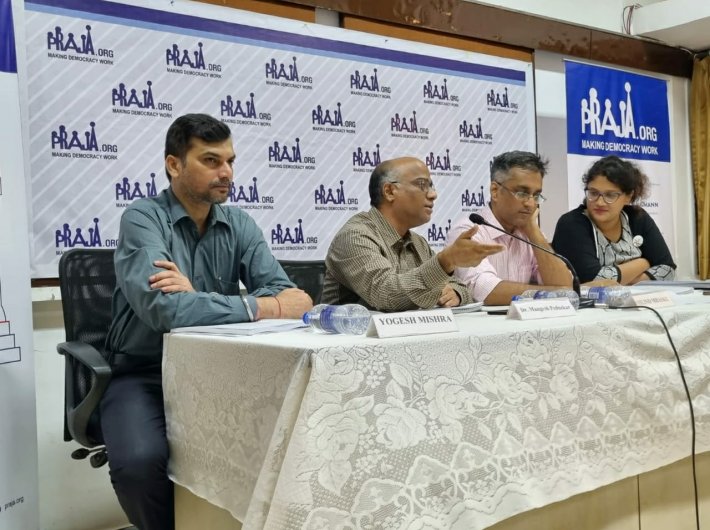Praja study: Out of every 100 questions raised, only 1 on diabetes and hypertension; only 2 on BMC dispensaries and hospitals
Praja Foundation’s latest report on the ‘State of Health in Mumbai’ finds an urgent need for the BMC to shore up and strengthen its primary healthcare centres and allocate towards this a fair budget.
In accordance with the central agencies norms, the BMC has significant shortage of personnel and infrastructure in its primary healthcare system. As of 2021, there is a shortage of 659 public dispensaries in the civic body’s healthcare system when the UDPFI (urban design plan formulation and implementation) norms prescribe for one public dispensary per 15,000 population.
However, none of the administrative wards in Mumbai meet this requirement. As per these norms the city region with 27% slum population needs more 133 dispensaries, western suburbs with 43% slum population require 315 and in eastern suburbs with 51% slum population there is a need for 211 more dispensaries. Moreover, vacancies of personnel in BMC’s dispensaries also increased from 10% in 2012 to 30% in 2021. 87 percent (163) of the 187 BMC dispensaries are open only for 7 hours i.e., from 9:00 am to 4:00 pm while only 6% (12) are accessible for 14 hours from 9:00 am to 11:00 pm.
Despite an increase of 196% from 2012-13 to 2022-23 in BMC’s health budget, the shortages exist. 73% of its total health budget for 2022-2023 has been allocated to hospitals and 27% on primary healthcare facilities. Citizens have to pay significant out of pocket expenses for their medical needs and forced to take private healthcare.
Further the report finds that only 1 out of every 100 questions were raised on diabetes and hypertension from 2012 to 2021 and only 2 out of every 100 questions were asked on personnel and infrastructural issues related to BMC dispensaries and hospitals from 2012 to 2021. More questions were raised on naming/ renaming of hospitals / health centre/ cemeteries.
“Our findings show that BMC has an adequate budget however the issue lies in prioritising its allocation. Although hospitals bear the load of secondary and tertiary healthcare and need significant budgetary allocation there is a need to lower the burden of citizens’ out-of-pocket expenditure on medical expenses by allocating a reasonable budget towards strengthening BMC’s primary healthcare services,” said Yogesh Mishra, head, dialogue programme, Praja Foundation.
WHO and India’s own healthcare policies like the National Urban Health Mission (NUHM) have emphasised that primary healthcare provide decentralised approach and acts as the first level of public healthcare services reducing the pressure on government hospitals. Additionally there are central government standards like the National Building Code (NBC) and Urban Design Plan Formulation and Implementation (UDPFI) that provide as benchmarks to assess primary healthcare services in cities.
“NBC and UDPFI norms prescribe one dispensary per 15,000 population. There is a shortage of 659 dispensaries in BMC’s healthcare system as per these norms. Due to many such deficiencies citizens are forced to access private healthcare services resulting in increase in out-of-pocket cost, which further leads to poverty,” said Milind Mhaske, CEO, Praja Foundation.
Praja in its 2019 survey had found that 31% of people belonging to the lowest socio-economic classes (SEC E) access private healthcare services and 76% spend more than 10% of their household expenses on medical expenses. Its analysis has been supported by the WHO report published on March 30 in which the global health body says that household out-of-pocket expenses on health services continue to push more than 5.5 crore people in India into poverty every year. Over 17% of Indian households incurring catastrophic levels of health expenditures annually.
Praja says that to improve primary healthcare, Mumbai needs to put in extra effort to meet its sustainable development goals (SDG) 2030. “Since the SDGs were adopted by India in 2015, we only have eight more years to achieve these targets. The target for communicable diseases like tuberculosis is 0 TB cases / 1 lakh population. However, there were 248 TB cases / 1 lakh population reported in 2021”, said Mishra.
Effective deliberations in BMC committees, especially on BMC’s primary healthcare services and infrastructure can help to bring about an improvement in the overall public health systems.
Dr Mangesh Pednekar, director, Healis Institute of Public Health, said that BMC needs to replicate its strategies applied to control Covid-19 to strengthen overall primary healthcare and maintain real time data on mortality and morbidity.
“BMC has demonstrated effective management strategies to control the Covid-19 pandemic by introducing decentralised Covid-19 war rooms in all 24 wards with real-time ward-wise data management. This was carried out through public-private partnerships and mobilizing civil societies and NGO infrastructure. Similar strategies need to be used to strengthen overall primary healthcare infrastructure and maintain real-time mortality and morbidity data in Mumbai,” he said.
Mhaske too concurred that for Mumbai to successfully achieve the SDG health targets it is important that health data on deaths and diseases are maintained effectively and in real-time.
“This can enable data driven interventions in framing and implementation of health schemes and policies” he said as he added that effective citizen centric deliberations and resourceful utilisation of the budget, appropriate allotment of infrastructure and human resources need to be ensured especially in wards catering to a larger population and low socio-economic classes. “This will encourage citizens to trust these facilities.”

